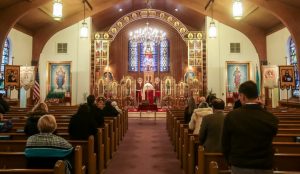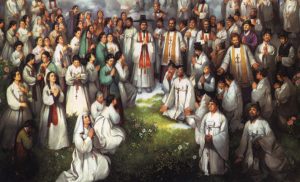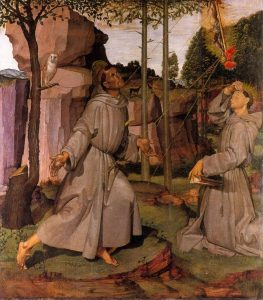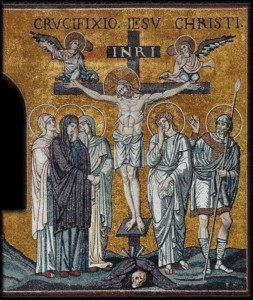 A brand new website for St Michael the Archangel Ukrainian Church, New Haven, Connecticut.
A brand new website for St Michael the Archangel Ukrainian Church, New Haven, Connecticut.
St Michael’s is a (Byzantine) Greek Catholic Church under the Eparchy of Stamford.
To celebrate the coming of autumn 2016, here is a Vivaldi piece to draw us closer to reality in the northern hemisphere. “Autumn” by Vivaldi’s The Four Seasons.
 The General Chapter of the Subiaco Cassinese Congregation elected today (22 Sept 2016) Father Guillermo Arboleda Tamayo, abbot of the Abbey of Santa Maria of Medellin and Administrator of Guatapè (Colombia) to be the new Abbot President. He succeeds Abbot Bruno who has served as praeses since 2004.
The General Chapter of the Subiaco Cassinese Congregation elected today (22 Sept 2016) Father Guillermo Arboleda Tamayo, abbot of the Abbey of Santa Maria of Medellin and Administrator of Guatapè (Colombia) to be the new Abbot President. He succeeds Abbot Bruno who has served as praeses since 2004.
Abbot Guillermo was born in 1956, ordained priest in 1980, professed as a monk of Guatapé in 1986. In 1991, Father was elected the Conventual Prior of Santa María de la Epifanía (Guatapè), Rionegro-Antioquia, Colombia, and then elected community’s first abbot in 1999. Then, in 2014, he took on the administration of the Abbey of Santa Maria of Medellin, before being postulated the abbot of the community.
Abbot Guillermo becomes the first Abbot President of the Subiaco Cassinese Congregation from the Americas.
 St. Andrew Kim was the first native Korean priest and the son of Korean converts. His father, Ignatius Kim, was martyred during the persecution of 1839 and beatified in 1925. After Baptism at the age of 15, Andrew traveled 1,300 miles to seminary in Macao, China. After six years of study, he returned to Korea and was ordained a priest. He was eventually arrested, tortured and beheaded near Seoul.
St. Andrew Kim was the first native Korean priest and the son of Korean converts. His father, Ignatius Kim, was martyred during the persecution of 1839 and beatified in 1925. After Baptism at the age of 15, Andrew traveled 1,300 miles to seminary in Macao, China. After six years of study, he returned to Korea and was ordained a priest. He was eventually arrested, tortured and beheaded near Seoul.
Paul Chong Hasang, 45, was a lay man and married, also martyred.
Pope John Paul II canonized Kim and the companions in 1984 when he visited Korea. The 98 Koreans and three French missionaries were martyred between 1839 and 1867. Among them were bishops and priests, but for the most part they were lay persons: 47 women, 45 men.
Sts. Andrew Kim Tae-gŏn, Paul Chŏng Ha-sang, and Companions, pray for us!
 The Franciscans mostly observe this event in the life of Saint Francis turned into a feast day of the Stigmata. It is recalled that Francis, in meditation on Mount Alvernia in the Apennines, in September 1224, received a vision of a six winged angel. Francis recalls that he was visited by angel and the Life-saving wounds of the crucified Lord. That is, he was left with wounds in his hands, feet, and side as though he had been crucified. The wound in his side often seeped blood.
The Franciscans mostly observe this event in the life of Saint Francis turned into a feast day of the Stigmata. It is recalled that Francis, in meditation on Mount Alvernia in the Apennines, in September 1224, received a vision of a six winged angel. Francis recalls that he was visited by angel and the Life-saving wounds of the crucified Lord. That is, he was left with wounds in his hands, feet, and side as though he had been crucified. The wound in his side often seeped blood.
Saint Francis and his conversion story, from the beginning, included a very great devotion and veneration for Jesus Christ crucified. He was constant in this aspect of the Paschal Mystery until he died.
Pope Benedict XI gave permission for the Friars to have an annual liturgical commemoration on this day the memory of this extraordinary event attested by reliable witnesses.
Saint Hildegard of Bingen (1098-1179) is a most attractive person with a personal relationship with Jesus Christ, a keen intellect and good zeal of a Benedictine nun. Knowing her history you would say she is a polymath. She said once, “There is the Music of Heaven in all things, and we have forgotten how to hear it until we sing.”
For many years it was hoped that Hildegard would be officially raised to the altar and be declared a Doctor of the Church. In deed, it was Pope Benedict who gave the Church this supreme gift of this saintly woman a witness to the new evangelization. Benedict stated:
In Saint Hildegard of Bingen there is a wonderful harmony between teaching and daily life. In her, the search for God’s will in the imitation of Christ was expressed in the constant practice of virtue, which she exercised with supreme generosity and which she nourished from biblical, liturgical and patristic roots in the light of the Rule of Saint Benedict. Her persevering practice of obedience, simplicity, charity and hospitality was especially visible. In her desire to belong completely to the Lord, this Benedictine Abbess was able to bring together rare human gifts, keen intelligence and an ability to penetrate heavenly realities.
Hildegard’s eminent doctrine echoes the teaching of the Apostles, the Fathers and writings of her own day, while it finds a constant point of reference in the Rule of Saint Benedict. The monastic liturgy and the interiorization of sacred Scripture are central to her thought which, focusing on the mystery of the Incarnation, is expressed in a profound unity of style and inner content that runs through all her writings.
The teaching of the holy Benedictine nun stands as a beacon for homo viator. Her message appears extraordinarily timely in today’s world, which is especially sensitive to the values that she proposed and lived. For example, we think of Hildegard’s charismatic and speculative capacity, which offers a lively incentive to theological research; her reflection on the mystery of Christ, considered in its beauty; the dialogue of the Church and theology with culture, science and contemporary art; the ideal of the consecrated life as a possibility for human fulfilment; her appreciation of the liturgy as a celebration of life; her understanding of the reform of the Church, not as an empty change of structure but as conversion of heart; her sensitivity to nature, whose laws are to be safeguarded and not violated.
For these reasons the attribution of the title of Doctor of the Universal Church to Hildegard of Bingen has great significance for today’s world and an extraordinary importance for women. In Hildegard are expressed the most noble values of womanhood: hence the presence of women in the Church and in society is also illumined by her presence, both from the perspective of scientific research and that of pastoral activity. Her ability to speak to those who were far from the faith and from the Church make Hildegard a credible witness of the new evangelization.
(Pope Benedict XVI, 7 October 2012)
 Standing by the cross of Jesus were his mother, and his mother’s sister, Mary the wife of Cleophas, and Mary Magdalene. When Jesus saw his mother, and the disciple whom he loved standing near, he said to his mother, “Woman, behold, your son!” Then he said to the disciple, “Behold, your mother!” And from that hour the disciple took her to his own home. (John 19:25-27)
Standing by the cross of Jesus were his mother, and his mother’s sister, Mary the wife of Cleophas, and Mary Magdalene. When Jesus saw his mother, and the disciple whom he loved standing near, he said to his mother, “Woman, behold, your son!” Then he said to the disciple, “Behold, your mother!” And from that hour the disciple took her to his own home. (John 19:25-27)
The day following the Exaltation of the Holy Cross is the feast day of Our Lady of Sorrows: the Holy Mother of God bearing the pain of her Son’s death. The feast reminds us to act, like Mary, to stand by the Cross and to hold in adoration the Crucified Lord. This is the drama of the mystery of suffering. Mary says nothing. Love doesn’t always need words. To speak words would be barbarous. Silence is the best response.
In fact, Mary’s dramatic action is what the Gospel records: she ‘was standing by the Cross’. Standing by in silence ought to be our position, too, because we are called to go deeper in our relationship with the Lord in contemplating the height and depth of His agony. Going deeper is accessed in and by silence. Her gift on this feast is the example of contemplation.
Making sense of this feast we need to comprehend the extent and suffering of Our Lady viz. the depth of love between mother and son. Love, the concern for the destiny of another, is the key.
From experience we know that every person who suffers finds Mary always beside him or her. A Mother does not abandon her children, even less in time of suffering. Can you imagine a mother not being present at the beside of her sick daughter? Calvary is impossible to experience without grace; we need the presence of someone who knows what is entailed in being faithful to the path given to us to walk.
Mary, Mother of Sorrows, may I be a comfort for Jesus if He can look down from the Cross and find you, His Mother, and me, holding your hand, “standing by the Cross”.
 From a Homily by John Paul II, 14 September 2003:
From a Homily by John Paul II, 14 September 2003:
Dear Brothers and Sisters,
The Cross is the “privileged place” where the love of God is revealed and shown to us. On the Cross human misery and divine mercy meet. The adoration of this unlimited mercy is for man the only way to open himself to the mystery which the Cross reveals.
The Cross is planted in the earth and would seem to extend its roots in human malice, but it reaches up, pointing as it were to the heavens, pointing to the goodness of God. By means of the Cross of Christ, the Evil One has been defeated, death is overcome, life is given to us, hope is restored, light is imparted.
In the Garden of Eden, at the foot of the tree, there was a woman, Eve (cf. Gen 3). Seduced by the Evil One, she takes possession of what she thinks is divine life. Instead it is a seed of death which enters into her (cf. Jas 1:15; Rom 6:23).
On Calvary, at the foot of the tree of the cross, there was another woman, Mary (cf. Jn 19:25-27). Accepting God’s plan, she shares intimately in the Son’s gift of self to the Father for the life of the world and, receiving from Jesus the entrustment of John the Apostle, she becomes the Mother of all mankind.
Image: Cathedral of Monreale, Sicily, Italy. 12th-13th century.